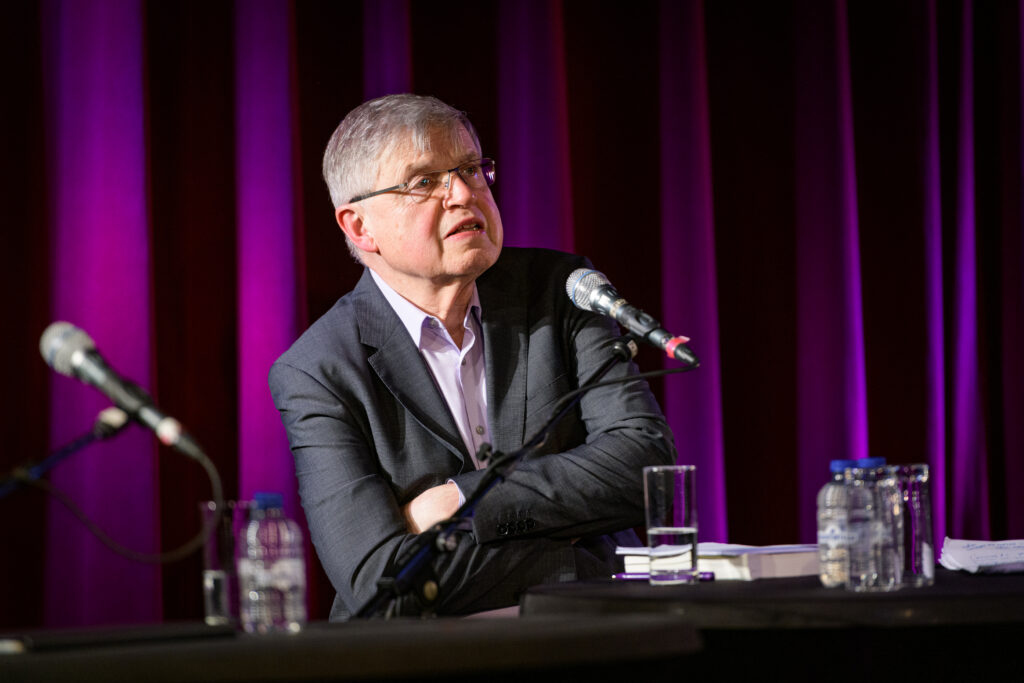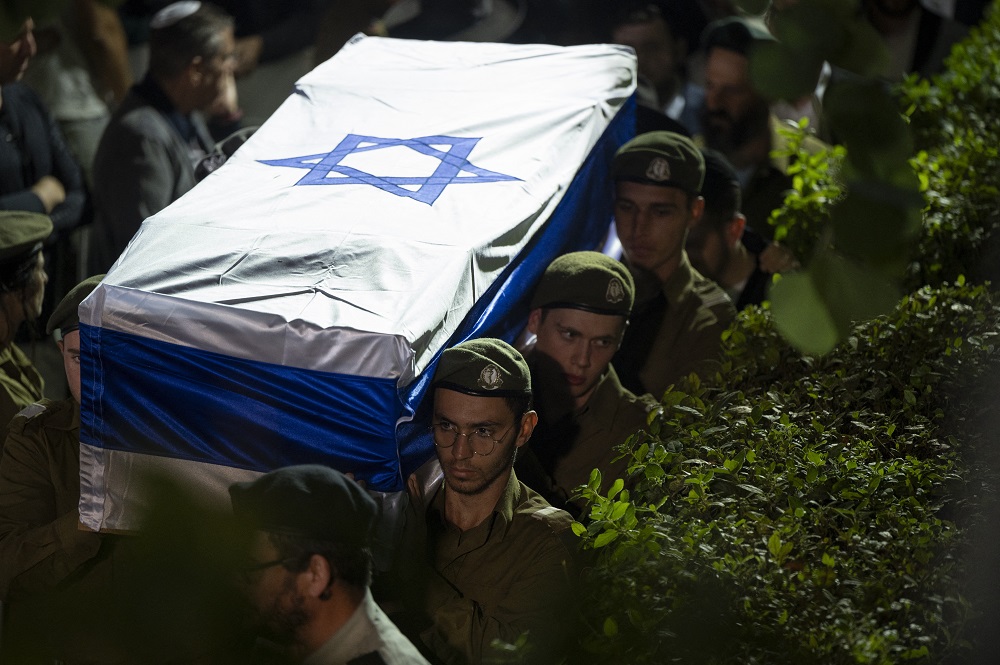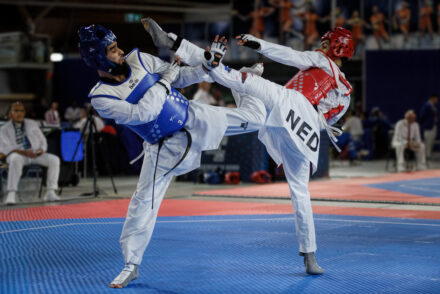Emeritus Professor Ernst Hirsch Ballin on Gaza war: ‘If you lose hope for peace, the people who sow hatred have won’
Airstrikes, hostage-taking, and thousands of deaths on both sides. The Israeli-Palestinian conflict reached an all-time low in recent weeks. There seems to be no peace for the time being. How has this been able to escalate so much and how should Israel and Palestine move forward?
Even before the war with Hamas broke out, Israel was already in crisis. The plans of Netanyahu’s administration to limit the power of the Supreme Court created deep internal divisions. The Gaza war seemed to change that. Hamas’ outbreak of violence on October 7 was totally unexpected for Israel. Never before have so many Israeli civilians—including many children—and soldiers been killed or kidnapped in a single day.
In response to the vicious attack, Israel struck back hard, causing thousands of casualties on the Palestinian side as well. Authorities in Gaza report that more than 8,000 Palestinians have died since the war began, including thousands of children. For Israel, the war with Hamas ensures that the internal divisions the country has been facing for the past year will fade into the background for now.
Emeritus University Professor and former Minister of Justice Ernst Hirsch Ballin feels touched by the war. Although peace between Israel and Palestine seems further away than ever before, he maintains the conviction that Israeli Jews, Palestinian Muslims, and Palestinian Christians must one day be able to find each other: ‘If you abandon hope for that, you cannot live anymore. It’s heartbreaking to see people suffering, on all sides.’
In what respect do you feel personally involved in this conflict?
‘The founding of the State of Israel has a history that, in a way, touches on my own family history. A national home for the Jewish people had been sought since the nineteenth century. In the 1930s, almost no country in Europe was willing to accept Jewish refugees from Nazi Germany. Many Jewish people were also turned away in the Netherlands.
‘My father was among the few Jewish refugees who were granted asylum in the Netherlands, after surviving the winter of 1938-1939 in the Buchenwald concentration camp. My father’s dearest niece was able to obtain asylum with her family—one of the few in our family—in the British Mandate Territory of Palestine.

‘It was not that Jews could easily seek asylum in the Mandate Territory at that time. In the 1930s, there was a strong growth in the Jewish population. The British wanted to temper tensions with the Palestinians living there by limiting immigration. My father’s niece survived World War II in the British Mandate Territory of Palestine, and her daughter and grandchildren still live in Israel.
‘Besides having family living in the conflict zone, the war affects me in another way. I am involved in a Catholic organization that has been supporting the dwindling group of Christians in Palestine for years. Their schools and hospitals are also open to other Palestinians, and that alleviates a little bit of the suffering of the continuing occupation. That suffering is constantly exacerbated by settlers.’
What do we need to know about this conflict?
‘I think it is important to keep two issues in sharp focus, without connecting them in an incorrect way. First, the heinous terrorist attacks and crimes Hamas committed on October 7 cannot be justified. It is a frontal attack on human dignity. Anyone who condemns that should put a period at the end of that sentence and not want to add anything else.
‘That doesn’t mean you should suddenly be silent on other subjects. Years ago, a writer—who feels connected to Israel—pointed out that Israel cannot simultaneously be Jewish, democratic, and encompass the entire historic land of Palestine. Two of the three is conceivable, but not all three. If Israel is both Jewish and democratic, it cannot encompass the entire historic land of Palestine. Because if it does include all of Palestine, it cannot be ‘merely’ Jewish.
‘Peace between Israel and Palestine is further away than ever before’
‘If it does want to be Jewish and include all of Palestine, it cannot remain democratic. We saw that recently with the sixth Netanyahu government. In it are two extremist parties who want to make the entire historic land of Palestine a Jewish state, and who undermine Israeli democracy. This led to the controversial proposals (in Dutch) that erode the rule of law.
‘In the past, Israeli politicians such as Yitzhak Rabin, Yossi Beilin, and Shimon Peres were willing to share the land with the Palestinians. But Rabin was assassinated by a Jewish extremist, Peres subsequently lost the elections, and Beilin has since left politics. Also on the Palestinian side, those working together for peace and a two-state solution (in Dutch) have lost their impact.’
Before the Gaza war, Israel was focused on legal reforms that divided the country to the bone. Was the Netanyahu government too busy with domestic politics to see the Hamas attack coming?
‘The tunnel network under Gaza and the quantity of rockets show that Hamas had been carefully preparing this attack for a long time. Even if there had not been a sixth Netanyahu government with the participation of far-right parties, Hamas would have tried something like this.
‘However, the formation of this government has plunged the country into deep division over the past year. Israel’s defense minister, Yoav Gallant, already called in March to put the ‘legal reforms’ to rest. He suspected that domestic divisions would lead to weakening of the defense.
‘We must not leave the future to extremists’
‘And no less damaging—both internally and externally—was and is the fixation on the ever-increasing expansion of Israeli settlements in the Palestinian territories, thus perpetuating the suffering that the Palestinian people have experienced from the occupation for decades.
‘Hamas denies Israel’s right to exist and the extremist parties in Israel deny the rights of the Palestinian people. And after Hamas’s horrific attacks, peace between Israel and Palestine is further away than ever before. This is an unprecedented tragedy, especially for all Israelis and Palestinians for whom peace is the highest priority.
Is peace between Israel and Palestine possible at all?
‘The assumption that ’the Israelis’ and ’the Palestinians’ cannot possibly agree is a falsification. I think it is important to say this explicitly. That falsification only fuels more enmity and hatred. Unfortunately, this is happening even in the Netherlands where anti-Semitism is rearing its head again in addition to Muslim hatred.

‘So you can see that extremists incite group-oriented hatred back and forth, and it is also becoming more and more intense. Unjustifiably because it is not ’the Israelis’ who keep going ahead with illegal settlements, nor is it ’the Palestinians’ who are responsible for what Hamas has done.
‘It is a requirement of humanitarian law to avoid further civilian casualties in Gaza as much as possible. But it is also necessary if we are ever to break free from this vortex of hatred and violence. Hamas achieved its first success with its atrocities on October 7. If things happen now that further fuel group hatred—including in other countries—they will achieve their second success. And this could get much worse if this turns into a peat moor fire of wars.’
What is the way out of this conflict?
‘However difficult we may imagine it now, in the end, there is only one way out of this conflict: a two-state solution and its economic connection, as sought by Shimon Peres. New borders will have to be drawn. A new approach to the holy places of Jews, Muslims, and Christians will also be needed, without one group claiming exclusive rights.
‘We cannot leave the future to extremists. A time will have to come for Palestinians and Israelis to demand this, for the sake of their future and that of their children. And if responsible leaders one day find the courage to act on it, then Israelis and Palestinians can plan to live and work together in peace.
‘That there are people who continue to pursue this—even now—gives hope. If you abandon hope, you cannot live anymore. Then the people who sow hatred and inflict degrading suffering have won. History teaches us that peace is possible: the French and the Germans found each other in building the European Union after a century with three destructive wars. Germans and Jews eventually found each other again even after the Shoah (the systematic persecution and genocide of Jews, ed.).
Translated by Language Center, Riet Bettonviel






